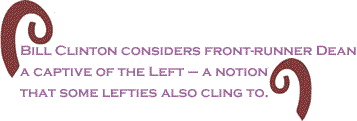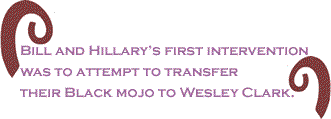| |
|
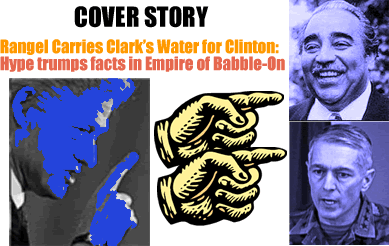
|
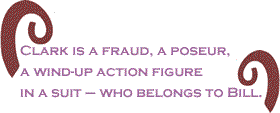
“Can
anything be more moving than the joyous throngs swarming
the streets of Baghdad? Memories of the fall of the Berlin
Wall, and the defeat of Milosevic in Belgrade flood back.
Statues and images of Saddam are smashed and defiled. Liberation
is at hand. Liberation – the powerful balm that justifies
painful sacrifice, erases lingering doubt and reinforces
bold actions. Already the scent of victory is in the air.” – Wesley
Clark, The
Times UK, April 10, 2003.
"Anybody
that's against the war that can beat Bush is going to be
overwhelmingly supported in the black community." – Rep.
Charles Rangel, endorsing Clark candidacy.
 What dissonance! What
nonsense! What will Bill Clinton think of, next? What dissonance! What
nonsense! What will Bill Clinton think of, next?
The
Arkansas Conjure Man with the 125th Street office has sucked
every brain cell
from Harlem Congressman Charles Rangel’s 73 year-old skull.
Rangel, who hopes to follow in the great Adam Clayton Powell’s
footsteps as Chairman of the House Ways and Means Committee
should the Democrats prevail in 2004, is betting the whole
legacy on a transparent lie – that Wesley Clark is an anti-war
candidate. Bill Clinton told him to do it.
Rangel
swallowed Bill and Hillary’s potion, gathered up his substantial bulk, and
fairly ran through the corridors of the Capitol soliciting
endorsements for the Clintons’ designated player. “This general
is a protection for America, to challenge this president's
policies without being called unpatriotic,” Rangel told the Associated
Press, September 19. “I feel like I've gone back to get
my big brother who's a four-star general."
Rangel’s
descent into second childhood is embarrassingly sad. There
is nothing to
commend the 59 year-old Clark to Black people or to anyone
else who opposes U.S. policy in Iraq. Wesley Clark is a kiss-ass
to Power, a karaoke performer with no song of his own. “President
Bush and Tony Blair should be proud of their resolve in the
face of so much doubt,” wrote Clark on April 10, every bit
as drunken and delirious as the rest of the Bush Pirates at the spectacle of Saddam Hussein’s wrecked
statue. “Liberation is at hand.” Clark approvingly predicted
that the American juggernaut would not – should not – come
to a halt in Baghdad:
“But
the operation in Iraq will also serve as a launching pad
for further diplomatic overtures, pressures and even military
actions against others in the region who have supported terrorism
and garnered weapons of mass destruction. Don’t look for
stability as a Western goal. Governments in Syria and Iran
will be put on notice – indeed, may have been already – that
they are ‘next’ if they fail to comply with Washington’s
concerns.”
Nowhere
can be found
a Clark statement that marks him as anything but a militarist
who had a slight case of the jitters prior to the invasion,
became a cheerleader once he thought the U.S. had triumphed,
and is now nervous all over again. Fairness and Accuracy
in Reporting’s excellent September
16 review of Clark-babble concluded: “While political reporters might welcome Clark's entry into
the campaign, to label a candidate with such views ‘anti-war’ is
to render the term meaningless.”
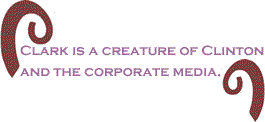
We will put it more bluntly: Clark is a fraud, a poseur, a
wind-up action figure in a suit – who belongs to Bill.
The retired general just wants to be important, and will
say
anything to that end. Most of his handlers wear the Clinton
brand. Thanks to the Clinton network, of which Rep.
Rangel is the chief Black operative, Clark was able to
project the early endorsement of 30 members of Congress.
Rep. Marion
Berry, working the South for his two fellow Arkansans,
predicts 50 congresspersons will soon line up for Clark,
including
half the good old boys of the “Blue Dog” coalition. That’s
Clinton power!
It
is pointless to discuss Wesley Clark’s personal “beliefs,” “ideas,” or “strategy.” Clark
is a creature of Clinton and the corporate media. (One might
even call him a Captive of Babble-on.) The proper question
is: What is Bill Clinton up to?
Saving the DLC
from itself
Bill
Clinton humiliated, abused, bamboozled and, finally, eviscerated
the base of
the Democratic Party in the Nineties. His biggest victories
were NAFTA and welfare reform, both achieved with overwhelming
Republican support. Clinton’s tenure marked the triumph of
the Democratic Leadership Council, the southern-born, white
male-pandering, union-bashing, corporate wing of the Party.
Republicans did a great service to Clinton and his Vice President,
Al Gore, by labeling them “liberals” – perversely confirming
that the DLC had succeeded in moving the national Democratic
Party rightward. Clinton unleashed the dogs of Wall Street
to inflate the speculative bubble that obligingly waited
for him to leave office before bursting – a legacy of corporate
mayhem, a marauding World Trade Organization, massive de-industrialization,
merger madness, and obscene growth in CEO compensation that
George Bush eagerly builds upon.
As
a sop to Blacks, Clinton promised to “mend, not end” affirmative
action.
Clinton’s DLC is
in trouble. The Black, union and anti-war base of the Democratic
Party has tagged the DLC’s candidate, Sen. Joe Lieberman,
as the personification of betrayal, and he is finished. Rep.
Dick Gephardt pins all his hopes on union endorsements based
on his leadership in the losing 1994 battle with Clinton
and the GOP over NAFTA. Massachusetts Sen. Jim Kerry is considered
too close to Edward Kennedy, who is anathema to DLC leadership.
And Senators John Edwards (NC) and Bob Graham (FL) no longer
matter.
That leaves Howard Dean, who enthusiastically supported NAFTA
as Governor of Vermont but now gets angry when reminded of
the fact. “Where did you get this, ‘I was a strong
supporter of NAFTA?’ I never did anything about it,” Dean
snapped at ABC’s George Stephanopoulos. (MSNBC,
September 17.) Dean means that, as a state Governor,
he did not have the opportunity to vote for NAFTA. Lucky
him, given the present Democratic political climate.
Bill
Clinton considers front-runner Dean a captive of the
Left – a
notion that some lefties also cling to. So Clinton pulls
all the switches to
light up his hologram, Wesley Clark.
Clinton’s
own magic lies largely in his ability to hypnotize significant
numbers of African Americans – a vestige of Old South race
relations. Bill and Hillary are “good white folks” – a rare
and welcome sight, back in the day. Clinton knows how to work
a Black church, and the congregation is always glad he came – grateful,
actually, for the attentions of “good white folks.” There is
really nothing more to it.
Determined
to once again crush the left wing of the Party, Bill and Hillary’s
first intervention was to attempt to transfer their Black mojo
to Wesley Clark. As the “first Black President” (courtesy
of Babble-on’s own Toni Morrison), and an icon at the Arkansas
Black Hall of Fame, Clinton appears to believe that “his” African
Americans are fungible commodities.
Eager
to please, Congressman Charles Rangel picked up the water bucket,
and carried it straight to the General. Rangel tells the story
somewhat differently, of course, claiming the endorsement was
his idea, but that he first called New York Sen. Hillary Clinton
because, well, that’s what friends do. "I talked to her
for an hour the other day and told her I was leaning toward
endorsing the general," Rangel told Newsday’s
Dennis Dugan. "She talked glowingly about General
Clark and what a fine president he would make, but then she
said, 'Charlie, I want to make it clear that I am not endorsing
General Clark.'"
Sorry,
Charlie. Nobody believes either one of you.
Speaking
Truth to white folks
The
same corporate media that pretend Al Sharpton, Dennis Kucinich
and Carol Moseley-Braun do not exist have suddenly discovered
blinding whiteness in the Dean camp. Although there is no doubt
that Dean’s digital-based campaign reflects the racial and
class character of the digital divide, the candidate was unfairly
mocked for his remarks at the Baltimore presidential hopefuls
debate, September
9. “I'm the only white politician that ever talks about
race in front of white audiences," Dean declared. Historically,
Dean is right on the mark; “mainstream” white candidates seldom
make anti-racism pitches to mostly white audiences.
Dean
distinguished himself, race-wise, early on and magnificently
at the Democrats’ winter meeting, February
21, in Washington: "White folks in the South who drive
pickup trucks with Confederate flag decals in the back ought
to be voting with us and not them, because their kids don't
have health insurance, either, and their kids need better schools,
too."
Nobody
but Dean on the “top tier” of candidates talks like that in
mostly white company. Now, that’s “good white folks” – for
what it’s worth.
|
| |
|
|
|

